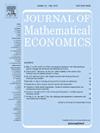合作式tu游戏:优势、稳定的组合和重新审视的核心
IF 0.7
4区 经济学
Q3 ECONOMICS
引用次数: 0
摘要
von Neumann和Morgenstern(1944)将稳定集合作为合作博弈的“解决方案”。之后,《Gillies》(1953)定义了游戏的核心。这两个概念都可以从支配地位的角度来建立。众所周知,核心可能是一个空集,而稳定集可能不存在,或者可能产生不同的建议。我们给出了一个新的优势关系,使得应用这一概念得到的稳定集(δ-稳定集)总是存在的,它是唯一的,并且它与合作对策的核心一致,只要核心不空。我们将这一概念应用于一些具有典型空核的特定类型的tu游戏:投票(多数)游戏,具有收益的最小成本生成树游戏,控制容量网络或m-排序游戏。本文章由计算机程序翻译,如有差异,请以英文原文为准。
Cooperative TU-games: Dominance, stable sets, and the core revisited
Stable sets are introduced by von Neumann and Morgenstern (1944) as “the solution” of a cooperative game. Later on, Gillies (1953) defines the core of the game. Both notions can be established in terms of dominance. It is well known that the core may be an empty set, whereas stable sets may fail to exist, or may produce different proposals. We provide a new dominance relation so that the stable set obtained when applying this notion (the -stable set) always exists, it is unique, and it coincides with the core of the cooperative game, whenever the core is not empty. We apply this concept to some particular classes of -games having typically an empty core: voting (majority) games, minimum cost spanning trees games with revenue, controlled capacitated networks, or -sequencing games.
求助全文
通过发布文献求助,成功后即可免费获取论文全文。
去求助
来源期刊

Journal of Mathematical Economics
管理科学-数学跨学科应用
CiteScore
1.70
自引率
7.70%
发文量
73
审稿时长
12.5 weeks
期刊介绍:
The primary objective of the Journal is to provide a forum for work in economic theory which expresses economic ideas using formal mathematical reasoning. For work to add to this primary objective, it is not sufficient that the mathematical reasoning be new and correct. The work must have real economic content. The economic ideas must be interesting and important. These ideas may pertain to any field of economics or any school of economic thought.
 求助内容:
求助内容: 应助结果提醒方式:
应助结果提醒方式:


